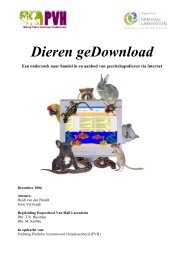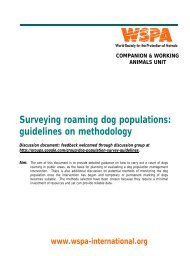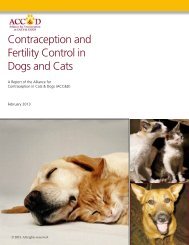download/print - Neighborhood Cats
download/print - Neighborhood Cats
download/print - Neighborhood Cats
- No tags were found...
Create successful ePaper yourself
Turn your PDF publications into a flip-book with our unique Google optimized e-Paper software.
6. Change municipal laws and animal control policiesIn some municipalities, there are laws which effectively outlaw TNR, such as bans onfeeding any animal outdoors, laws prohibiting cats from roaming freely (“at large laws”)and limits on the number of animals a resident can own with “ownership” defined in amanner that includes feral cat caretakers. In other locales, animal control may have apolicy of trying to trap and remove all free-roaming cats, neutered or not. To openlypractice TNR in such communities, these kinds of hostile laws and policies must first beaddressed and changed.Effective advocacy of TNR on the government level requires careful planning, andexperience in this realm is very helpful. If you’re new to TNR and political advocacy,consult with more experienced activists before meeting with the town council or the headof animal control. Again, study Chapter 2 so you can clearly explain to others thebenefits of TNR. See if there is a feral cat organization or program nearby with theknowledge of how best to approach the issue. Consult the <strong>Neighborhood</strong> <strong>Cats</strong> websitefor ideas and materials, such as pro-TNR position statements from The Humane Societyof the United States and the ASPCA. You can also contact us for advice atinfo@neighborhoodcats.org.Government officials will make their decisions based on what theybelieve is best for their human constituents, not what’s best for thecats. So focus on topics like lowering the number of free-roamingcats, cost savings and public health benefits, not on how the cats’health improves with TNR. Look the part by dressing professionallyand leave the cat-themed T-shirt, cap and sweater at home! Poisoning threatsWhen a feral cat colony is unmanaged and in crisis, occasionally a threat to poison ismade by a resident in the area. If this happens, the first thing to do is find out what thelaw is in your state or county. In many jurisdictions, poisoning is a form of animalcruelty and a crime, even a felony with a possible prison sentence in some states. To findout if poisoning is an offense where you reside and, if so, what the penalties are, call yourlocal shelter or animal control agency, check the Internet or ask an attorney friend.People who threaten or actually attempt to poison are usually unaware this is a seriousoffense. One way to deter them is to let them know. Make up a “Stop Poisoning” postersimilar to the one in Appendix A of this handbook. The poster should include themaximum penalty for poisoning and offer a reward for information leading to arrest andconviction. Print out copies on bright pink paper and post them around the neighborhoodin question, leaving a few extra copies in front of the suspect’s residence or place ofemployment.Keep in mind the purpose of the poster is not to catch anyone, but to deter any wouldbepoisoner from acting. You can rest easy about having to pay the reward - it’sextremely unlikely anyone will ever be arrested, let alone convicted, as a result of20








